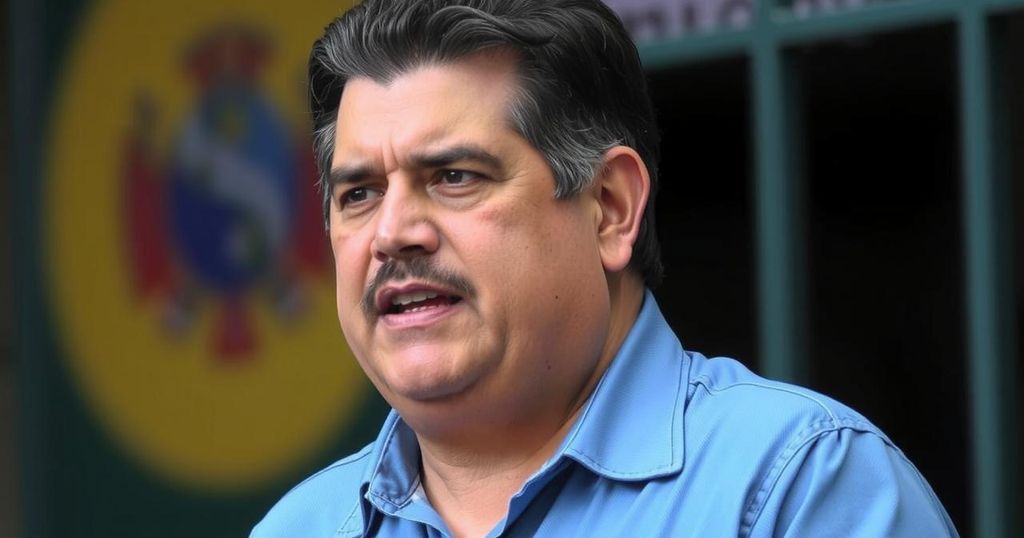Politics
ARGENTINA, ASIA, BRAZIL, CARACAS, COLOMBIA, CORRUPTION, CUBA, DEMOCRACY, DIPLOMATIC RELATIONS, ECUADOR, EUROPE, LULA, MACHADO, MILITARY INTERVENTION, MURILLO, NICOLAS MADURO, NORTH AMERICA, PEDRO URRUCHURTU, PHILIPPINES, QUITO, SAN ANDRÉS, SAN ANDRES, SOUTH AMERICA, SPAIN, TRADE RELATIONS, UNITED NATIONS HUMAN RIGHTS COUNCIL, VENEZUELA
Leila Ramsay
0 Comments
Colombia Proposes Custody of Argentine Embassy Amid Venezuela Tensions
Colombia has offered to take custody of Argentina’s Embassy in Caracas, sheltering six aides of opposition leader María Corina Machado amidst escalating Venezuelan tensions. Direct negotiations are underway for their safe passage, contingent on addressing the release of a Venezuelan official and Ecuador’s ex-vice president. The situation reflects a broader diplomatic engagement regarding human rights violations in Venezuela.
Colombia has proposed to take custody of the Argentine Embassy in Caracas, currently sheltering six aides of opposition leader María Corina Machado since March. The offer was announced by Foreign Affairs Minister Luis Gilberto Murillo during a conference in San Andrés, Colombia. He indicated that direct negotiations with Venezuela’s government are underway to ensure the safe passage of these opposition officials, contingent upon convincing Argentina to release a Venezuelan official and securing the release of Ecuador’s former vice-president, Jorge Glas.
The backdrop of this situation involves rising tensions between Venezuela and its neighbors, particularly following President Nicolás Maduro’s crackdown on dissent post his contested re-election. The six aides have sought refuge from what the Venezuelan government labels acts of terrorism, in light of the political fallout surrounding Machado and her designated candidate, Edmundo González Urrutia. The situation has exacerbated since Argentina severed diplomatic ties with Venezuela, transferring embassy oversight to Brazil.
In recent developments, Venezuelan police have intensified their harassment of the embassy, which included cutting utilities and limiting access to essential resources for the opposition group sheltered there. Actions described by the United Nations Human Rights Council as violations of international law have compounded the crisis. Comprised of significant political personnel, the group includes campaign manager Magalli Meda and advisers Pedro Urruchurtu and Claudia Macero. Amidst this, both Maduro and González, now in Spain, plan to be sworn in for new presidential terms commencing January 10.
Under President Gustavo Petro’s mandate, Murillo traveled to Brazil and Ecuador to address these diplomatic challenges. Although Brazil has committed to maintaining custody of the embassy until an Argentine replacement is appointed, Argentina decried that the ongoing situation illustrates a blatant disregard for fundamental human rights in Venezuela. Despite previous tension, recent dialogues between Venezuela and Brazil resumed following the elections, although President Luiz Inácio Lula da Silva remains non-committal in recognizing Maduro’s presidency, urging transparency regarding the electoral process.
The political landscape in Venezuela has been increasingly fragmented following President Nicolás Maduro’s controversial re-election amid significant dissent. Maria Corina Machado, a prominent opposition leader, and her aides sought refuge in the Argentine Embassy to avoid potential arrest under accusations of terrorism, reflecting the precarious state of human rights in the country. Colombia’s involvement represents an emerging regional diplomacy aimed at navigating the crises surrounding human rights and political legitimacy in Venezuela. The escalation of Venezuelan police intimidation against the embassy underscores the mounting pressures opposition members face and the international community’s concern over violations of international law.
Colombia’s proposal to safeguard opposition officials through the custody of the Argentine Embassy showcases the burgeoning diplomatic efforts amidst Venezuela’s political unrest. The situation not only highlights the humanitarian implications for those opposing Maduro’s regime but also underscores the international community’s role in advocating for human rights amid escalating tensions. As Colombia engages with neighboring governments, the potential for regional collaboration in addressing Venezuela’s crisis could prove pivotal in shaping the future of its political landscape.
Original Source: www.batimes.com.ar




Post Comment